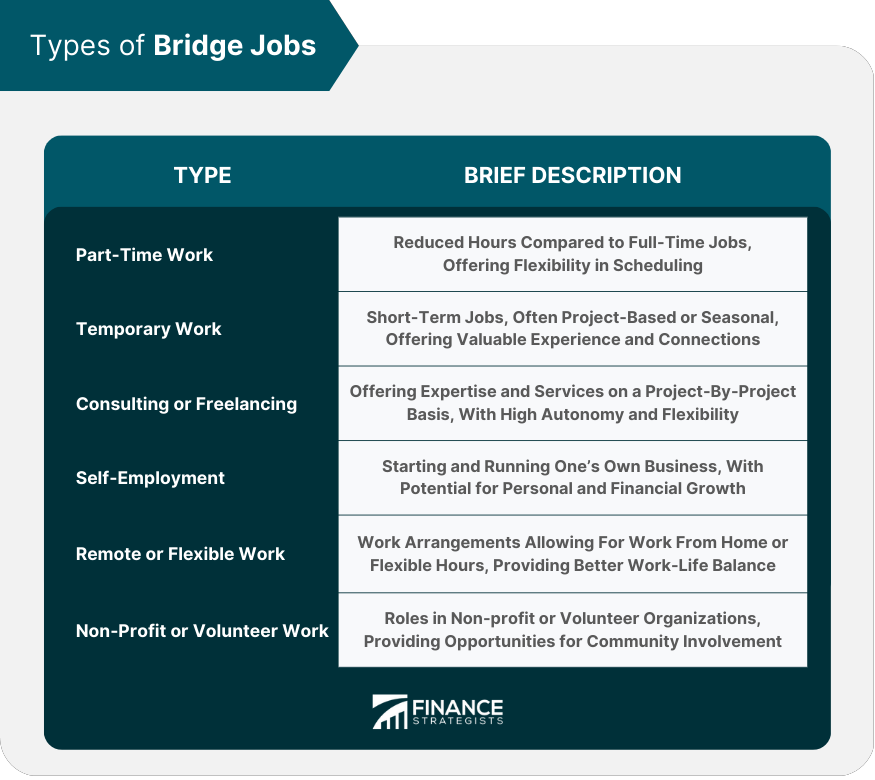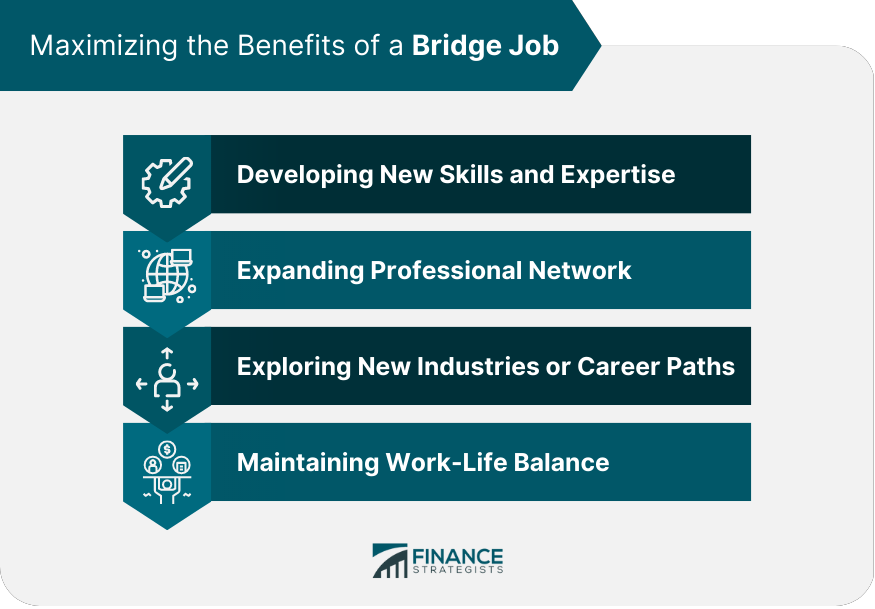A bridge job is a short-term, temporary, or transitional position that allows individuals to transition between two stages of their career or life. These jobs often serve as a stepping stone for those looking to switch careers, re-enter the workforce, or delay full retirement. Bridge jobs offer individuals the opportunity to gain new skills, explore different industries, and maintain a work-life balance. They can also provide a sense of purpose and financial security during periods of uncertainty or change. The increasing popularity of bridge jobs can be attributed to various factors, including the growing gig economy, an aging workforce, and evolving attitudes towards traditional career paths and retirement. Part-time positions offer reduced hours compared to full-time roles, allowing individuals to balance work with other responsibilities or interests. These roles may be found in various industries and offer flexibility in terms of scheduling. Temporary jobs are short-term positions that can last anywhere from a few days to several months. These roles are often project-based or seasonal and can provide valuable experience and connections. Consulting and freelancing opportunities allow individuals to offer their expertise and services on a project-by-project basis. This type of work offers a high level of autonomy and flexibility, as professionals can choose the projects they work on and set their own schedules. Self-employment involves starting and running one's own business. This path offers the potential for significant personal and financial growth but may also require a considerable investment of time and resources. Remote or flexible work arrangements allow employees to work from home or choose their own hours, providing greater control over their work-life balance. Non-profit or volunteer roles offer individuals the opportunity to give back to their communities and gain experience in a particular field or cause. While these positions may not always provide financial compensation, they can be personally rewarding and can lead to future paid opportunities. Before pursuing a bridge job, it's essential to consider one's personal and professional goals, as well as any financial or lifestyle needs that must be addressed during the transition. A key aspect of transitioning into a bridge job is recognizing the skills and experiences that can be applied to new roles or industries. This may include communication, problem-solving, or leadership abilities. Networking and targeted job searches are crucial for finding bridge job opportunities. Utilizing personal connections, attending industry events, and leveraging online resources can all help individuals identify potential openings. To successfully secure a bridge job, candidates should update their resumes and cover letters to emphasize relevant skills, experiences, and accomplishments. Tailoring application materials to each specific opportunity can help demonstrate a genuine interest in the position. Preparing for interviews is essential for successfully landing a bridge job. This includes researching the company and role, practicing common interview questions, and showcasing relevant skills and experiences. Bridge jobs offer the opportunity to acquire new skills and knowledge, which can help enhance one's professional value and marketability. Working in a bridge job can help individuals connect with professionals in their chosen field, leading to potential job opportunities and career growth. Bridge jobs allow individuals to test out new industries or career paths without committing to a long-term position, providing valuable insights into their preferences and future career goals. By offering flexibility in scheduling and work arrangements, bridge jobs can help individuals maintain a healthy work-life balance, allowing them to focus on personal interests and responsibilities alongside their professional commitments. One of the primary challenges associated with bridge jobs is the potential for reduced income and job security. Temporary, part-time, or freelance roles may not offer the same level of financial stability as full-time, permanent positions. Transitioning to a bridge job may require adapting to new work environments, company cultures, or job expectations, which can be challenging and require a period of adjustment. Some individuals may face a stigma associated with working in temporary or part-time roles, as these positions are sometimes perceived as less prestigious or indicative of a lack of commitment to one's career. For those pursuing multiple bridge jobs or juggling work with other responsibilities, finding a balance and managing time effectively can be challenging. Bridge jobs are reshaping the labor market, offering more flexible and diverse employment opportunities for workers across various industries and stages of their careers. As more individuals pursue bridge jobs, the perception of traditional career paths and the importance of long-term, full-time employment is shifting, with greater emphasis placed on personal growth, flexibility, and work-life balance. Bridge jobs play a significant role in the gig economy, as more professionals embrace freelance, contract, and temporary work as viable career options. The rise of bridge jobs may also impact retirement and social security policies, as individuals delay full retirement or transition between employment and retirement multiple times throughout their lives. Bridge jobs have become an essential component of today's workforce, offering flexibility, personal growth, and the opportunity to explore new career paths. The rise of bridge jobs has resulted in numerous benefits for individuals and society as a whole, including increased work-life balance, skill development, and a more diverse and adaptable labor market. By pursuing bridge jobs, professionals have the chance to grow, learn, and explore new opportunities, ultimately leading to more satisfying and fulfilling careers.What Is a Bridge Job?
Types of Bridge Jobs
Part-Time Work
Temporary Work
Consulting or Freelancing
Self-Employment
Remote or Flexible Work Arrangements
Non-profit or Volunteer Work

Transitioning Into a Bridge Job
Assessing Personal Goals and Needs
Identifying Transferable Skills
Networking and Job Search Strategies
Updating and Tailoring Resumes and Cover Letters
Preparing for Interviews
Maximizing the Benefits of a Bridge Job
Developing New Skills and Expertise
Expanding Professional Network
Exploring New Industries or Career Paths
Maintaining Work-Life Balance

Challenges and Potential Drawbacks of Bridge Jobs
Income and Job Security Concerns
Adapting to New Work Environments and Expectations
Possible Stigma Associated With Temporary or Part-Time Work
Balancing Multiple Jobs or Commitments
Bridge Jobs and the Future of Work
Impact on the Labor Market
Changing Attitudes Toward Traditional Career Paths
Role of Bridge Jobs in the Gig Economy
Potential Influence on Retirement and Social Security Policies
Conclusion
Bridge Job FAQs
A bridge job is a temporary job taken by an individual who is in between their careers or is looking for a new job. It is usually taken to bridge the gap between two jobs.
Taking a bridge job can help you pay the bills while you are searching for a job that aligns with your career goals. It can also help you gain new skills and experience that can be useful in your future career.
Bridge jobs can be in various industries and roles, depending on your skills and experience. Some common examples include retail sales, customer service, administrative roles, and delivery jobs.
The duration of a bridge job varies from person to person. Some people only stay in a bridge job for a few weeks, while others may stay for several months. It ultimately depends on your individual situation and career goals.
You can make the most out of your bridge job by treating it as a valuable opportunity to learn new skills and gain experience. Take on new responsibilities, network with your colleagues, and use the job as a stepping stone towards your next career move.
True Tamplin is a published author, public speaker, CEO of UpDigital, and founder of Finance Strategists.
True is a Certified Educator in Personal Finance (CEPF®), author of The Handy Financial Ratios Guide, a member of the Society for Advancing Business Editing and Writing, contributes to his financial education site, Finance Strategists, and has spoken to various financial communities such as the CFA Institute, as well as university students like his Alma mater, Biola University, where he received a bachelor of science in business and data analytics.
To learn more about True, visit his personal website or view his author profiles on Amazon, Nasdaq and Forbes.















